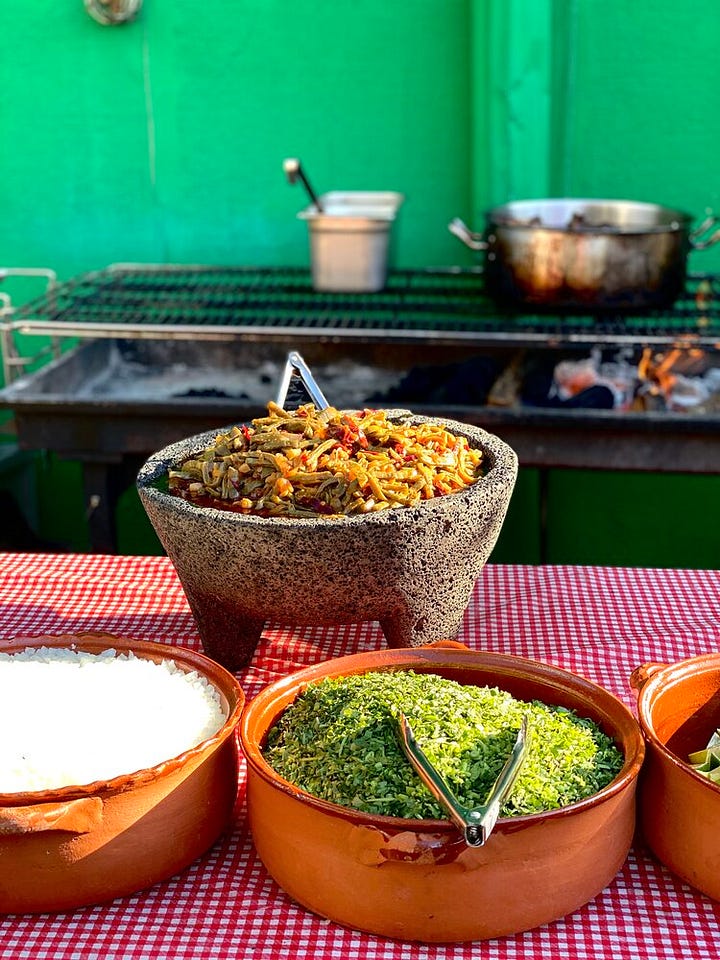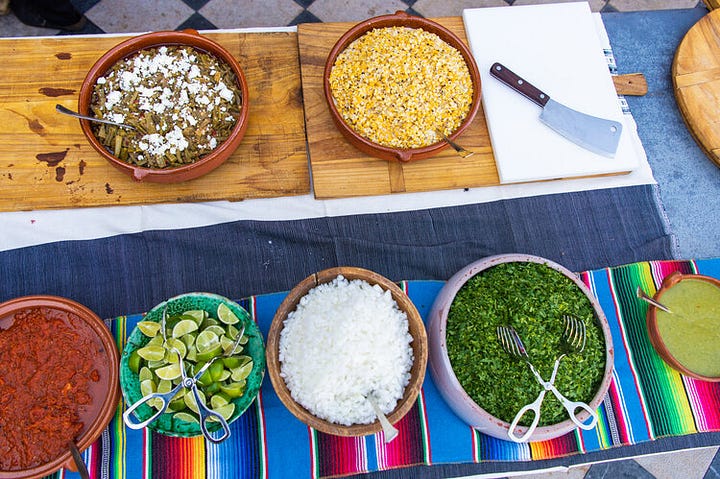Following your Heart in the Kitchen: Interview with Chef Jonathan Zaragoza
This week’s interview is with Chef Jonathan Zaragoza, a Chicago-based chef known for his family restaurant Birrieria Zaragoza.
Jonathan got his start early in life when his father opened up an underground restaurant in the family’s basement. He spent his teenage years stoking the fire of the family’s outdoor oven as he cooked and prepared the goat for the restaurant’s signature birrieria dishes. That restaurant eventually turned into its storefront, which Jonathan helped open and manage for several years, before going out on his own. He worked at a number of Chicago restaurants including Masa Azul where he became head chef at age 22. Since then, he’s opened a variety of pop-ups and restaurant concepts, cooked internationally, worked with brands on ad campaigns, and is even in the process of writing a children’s book!
There was so much I wanted to know about Jonathan’s experience: What was it like working in the family’s underground restaurant? What keeps him excited to take on new projects? What’s the mindset he has to be in the make a meal or new idea come together? What has he learned about challenging self-doubt? What’s it like to stretch his creative muscles in new directions?
We spoke about:
Getting his start in the family’s underground restaurant
How he decided that culinary school wasn’t right for him and the advice he gives to young chefs
What it’s like to open new concepts
What helps him stay creatively inspired
Getting into flow in the kitchen
Reframing failure as a creative
His upcoming projects
Note: The following interview has been lightly edited for clarity and length. While every effort has been made to preserve the integrity of the conversation, please be aware that the quotes may not be verbatim but reflect the essence of the dialogue.
Let’s start with a few rapid-fire questions to set the scene.
Where do you live? Chicago. I’ve been here my whole life - 34 years now.
How would you describe your occupation? I’m a chef by trade. Basically a creative person who likes to do a lot of different things
What’s the story behind your social media handle @goatboyintl? During my second stint of culinary school (I'm a 3-time dropout) at Kendall College, there was an instructor who was taking roll call. She said that my name sounded really familiar. The restaurant was open at this time and was just starting to get some notoriety in the media. I was trying to maintain a low profile. A week later she brought in an article that I was in, threw it on my workstation, and said “You’re the goat boy.” I asked her not to say anything. Then, another classmate came in a couple of weeks later with another article. This time she goes, “Oh, you’re Goat Boy International! Now everyone knows about you.” Instagram and Twitter were just starting out at the time. The nickname has been my handle ever since.
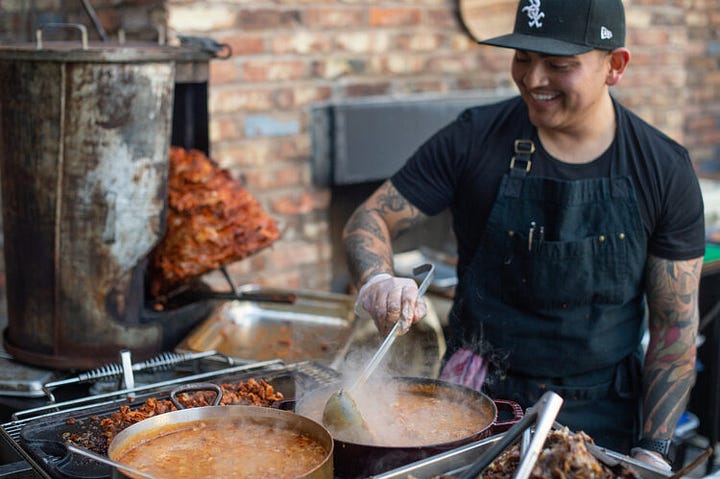
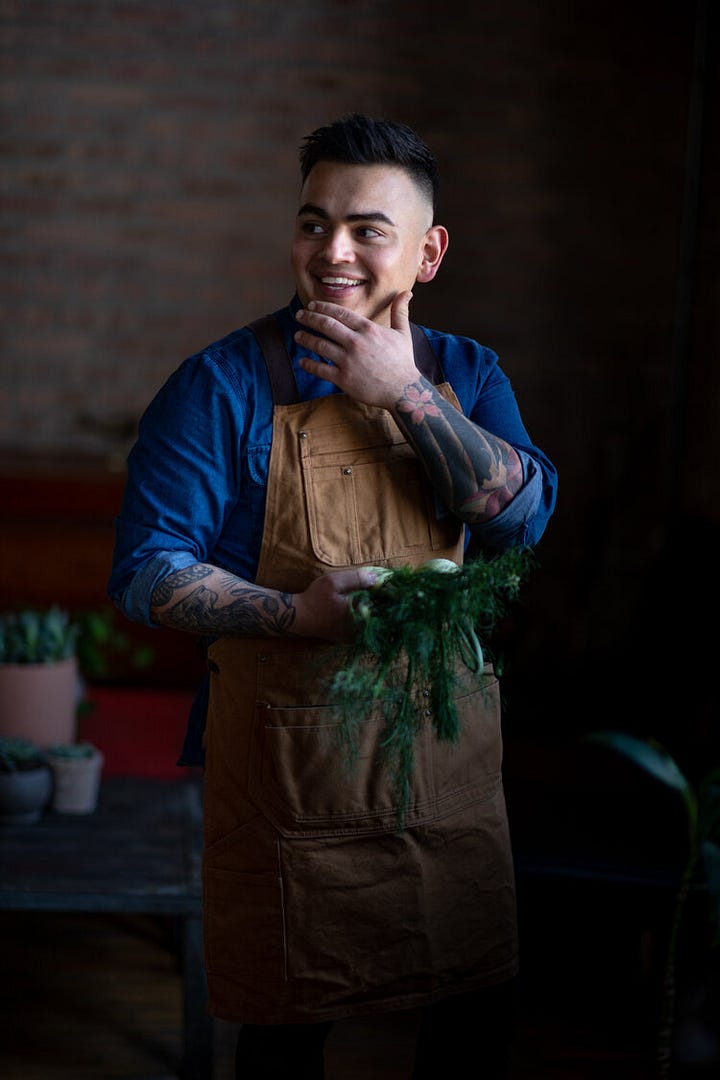
Let’s go back to the beginning. Your dad started an underground restaurant in your basement which eventually turned into a separate storefront. What was that experience like for you growing up around the restaurant? What did you learn from your parents?
I was 12 when we built the oven in our backyard. My dad built it with my grandfather and the help of a neighbor. I was raised a little bit old school. I was pretty much driving at 12 and getting around that way. In retrospect, it’s hilarious. I do talks at schools now, look at these kids, and I can’t believe I was doing that.
Anyway, we built an oven in our backyard. We had a finished basement where we would cook a goat Friday night for Saturday service and then Saturday night for Sunday service. I think my dad was just trying to practice and get his recipes down initially. I'm the oldest son in a Mexican first-generation family. It was assumed that I was going to be the helper.
Rain, sleet, or snow, I was out there stoking the fire for six hours. So starting at 6:00pm, I had to get the fire going, and then at midnight I had to get the agave leaves wrapped around it no later than 12:30. At 6:00 am, I would come back, take out all the cooked goat, and then marinate it and roast it for service. It was a whole to do.
I love baseball, and it was kind of there as an incentive. My parents said, “If you want to earn money for your equipment and do other stuff, there's work to be had.”
Your dad sounds fearless. What’s the mindset you feel you’ve picked up from him?
Fearless is definitely a word to describe his personality and approach. I think starting the restaurant was an act of defiance for him. He and my mom were working corporate jobs, and they were tired of the 9 to 5 grind. There's nothing wrong with it, but I don't think they were cut out for it, even though they did it for a long time. As a kid, I didn't have the life experience or wherewithal to pick up all these other lessons I'm getting now. Looking back with a little bit more life experience and years under my belt, I can understand and cherish the lessons I learned from them.
What was it like breaking into the restaurant world on your own?
I was surrounded by a lot of good mentors who saw my energy and approach, which was pretty much reckless abandon and willful ignorance, and responded to it. They saw that I showed up and worked hard. I’m lucky they responded to that so early on in my career.
I was 22 when I got my first executive chef job. I was 18 years old when I opened the family restaurant and worked there for a couple of years. At 19 years old, I had already worked for a Michelin-star restaurant, and by 20, I’d worked for another one. Early on with the family restaurant, I recognized that this was what I would be doing for the rest of my life.
I didn't plan to drop out of culinary programs twice, but I knew that I needed to do things in my own way and was lucky to have mentors who supported that.
How did you know that culinary school wasn’t going to be the right path for you?
I just hated school. I was so burned out by the rigidity of class and just wanted to be able to do my own thing.
When aspiring chefs ask me about culinary school I say, “Personally, I dropped out twice. It wasn't for me. It doesn't mean it's not right for the next person.” I really try to tell people, “Hey, if you are interested in this, go spend the week working in restaurants. Work for different people and get a good scope of what the industry might look like for you.”
It sounds like, “There’s no one right way to do this. Figure out what works for you.”
Yea, I think now more than ever, young chefs have so much at their disposal with technology. You can get your stuff out there and your career can blow up in an instant. Those options weren't as available or accessible when I was starting out. A lot of this industry is about the love of the hustle and you can now see that hustle in different ways.
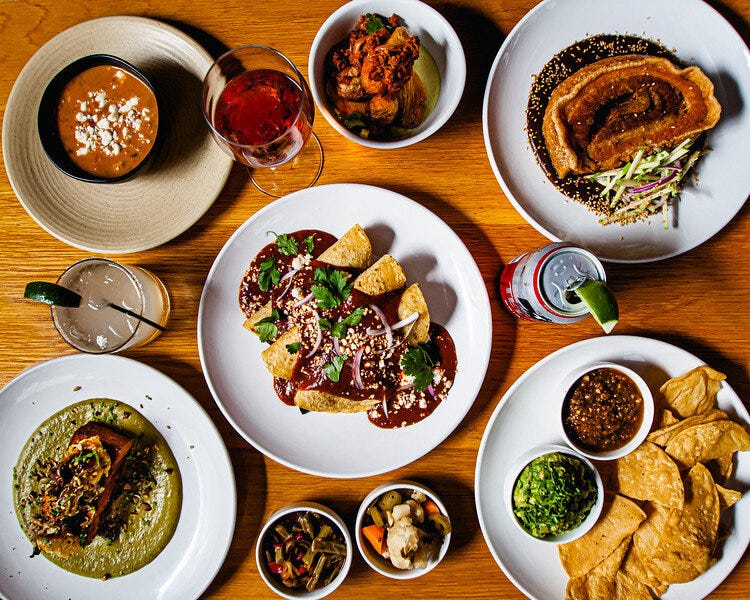
What’s the most honest way you would describe what it’s like to open up a new concept?
I think each concept changes every time. There are different people that you're working with, different neighborhoods. There are a lot of variables. The experience encourages you to be open to new experiences and constant learning. I learn something new with every opening. I think that's the biggest thing for newcomers - you have to be open to new experiences and be open to skinning your knee here and there. Some are great and some don’t pan out the way you thought. You learn what to look out for, while still being kept on your toes.
You’ve done a lot of different residencies and concepts. What helps you stay excited to continue trying new things?
The connection with the people. I love teaching and learning in the kitchen. With every opening, you get a new crew and a group of people coming from different places and experiences. Pro cooks don’t always like this, but I always tell my new chefs, “Follow your heart.” They'll say, “Chef, what do you think about this?” I'll give them a little direction, and then there's usually a follow-up question. At that point, I just say, “Follow your heart.” I like that because I want them to figure it out and be creative and kind of mischievous in finding a way to do it differently.
Do you ever get nervous or have doubts before a new opening?
Absolutely. I was never the most confident kid growing up, and I still deal with it. The more you do it, the more you realize that “better” is not really a term as a creative. I don't think there are people who are better than somebody else, or better than the other person. I do think that people are different. I’ve done events and hooked elbows with some of the best chefs in the world. I’ll have the thought: “What am I doing here? What do they see in me?” The imposter syndrome definitely comes up. I use that as fuel and say, “I can do this. I’m here.”
Do you ever feel like you need breaks away from the kitchen? What do you do to stay creatively inspired?
My girlfriend and I love to travel. We had 2 dogs and just lost the second one. That’s been brutal. That was a big part of my decompression - spending time with Wednesday and Apple and taking them to the beach and on hikes. It's funny because when you’re on a walk, the dog's not talking to you, but I was definitely talking to her. Often the inspiration would hit on those walks. You need to step away from the kitchen sometimes, take a little breather, and gain some perspective. The travel allows me to access new experiences, steal recipes, and meet thousands of new people from across the globe.
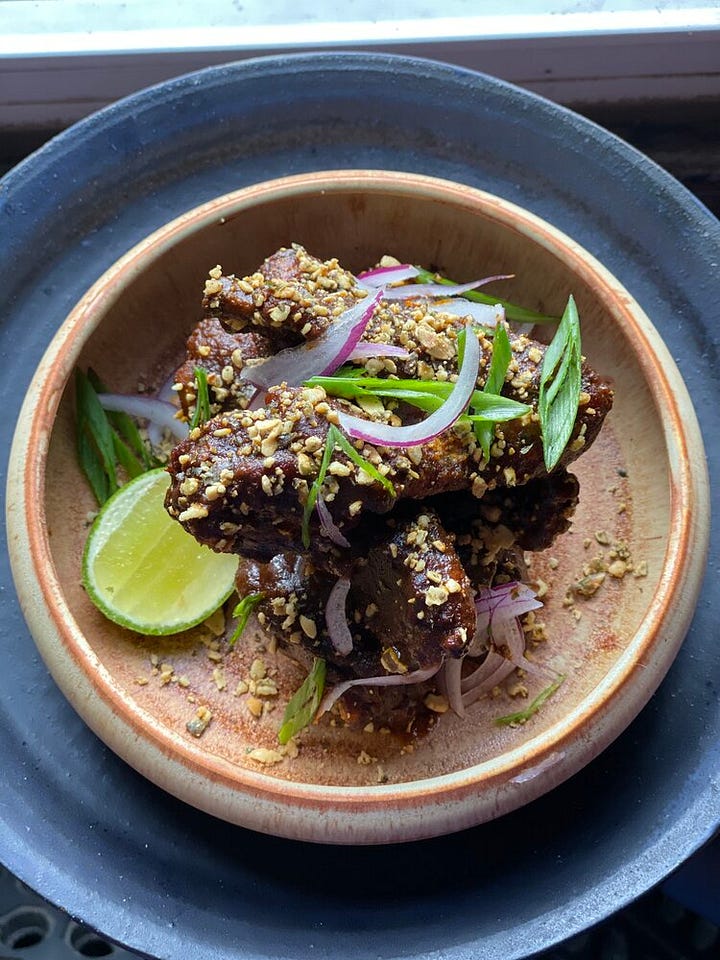
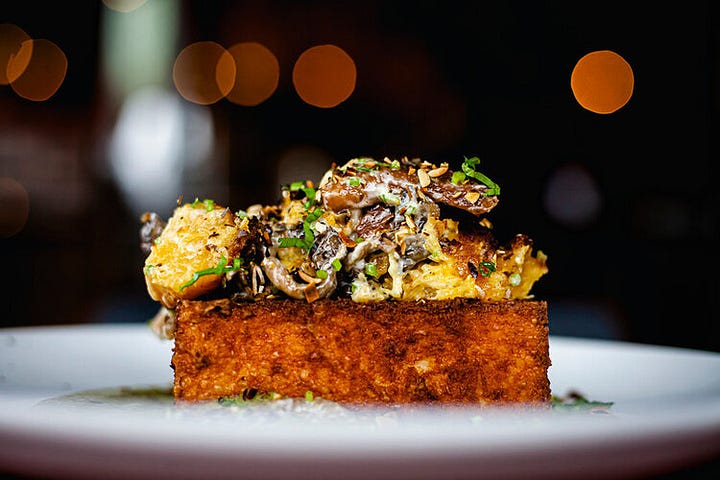
What do you feel you've learned from being a chef and creative that has translated into the bigger picture of your life?
I think the way people cook says a lot about who they are. It's inherently tied to their character. Some people are good at masking poor qualities, but I think in tasting someone’s food you can feel their energy. When I go out and travel, I'm a big street food eater because that's how I started cooking. I love the tradition of having a very rustic approach to a singular dish. That’s what I gravitate towards.
I think cooking has taught me resilience for sure. It’s taught me how to nurture myself and other people. It’s taught me how to keep my curiosity up and continue to encourage this appetite for adventure and travel.
What headspace do you have to be in for a new idea or meal to come together in a really innovative or interesting way?
There are 2 things you never want to do: cook angry or cook afraid. I always tell my cooks, “Don't cook scared. You have to believe in yourself.” I’ve definitely cooked angry and afraid, but I’ve had to work through those emotions. Finally, you get into the zone when you're in service and everything in the background just becomes blurred. That's how it feels. You’re zoning. That's the adrenaline junky vibe that cooks love; that zoning out and being in the moment. It takes a lot to get to that point and have the stripping back of the ether and all the stuff. It takes practice - it’s almost like meditation. That said, we're human. Sometimes it doesn't work out and sometimes you're on the line and you're upset.
What happens when you cook angry or cook upset?
Whoof! It's hard to remember those times. I think you black out and the trauma response kicks in. I think in the moment you work through it because if you're in tune and accepting of the message the world's trying to give you, you can work past the emotion rather quickly. If a young cook doesn't have the life skills to work past that stuff, the leader needs to recognize that and say, “Hey, why don't you take a couple of minutes and I'll cover your station?”
What have you learned about being a leader in the kitchen and managing/mentoring young chefs?
In my early career, I definitely had the “fake it until you make it” vibe. I thought, “I’m 22 and you want me to run a restaurant?” Google got used a lot!
I really take it upon myself to be an active participant in the hiring process. When you open up new concepts, you need veteran leadership and people to bounce ideas off of. I like empowering that veteran to lead and mentor the young kids. But I do try to hire a lot of young people. In my restaurants, I probably go for something like 15% veteran, 80% new. I love having newbies in the kitchen because it keeps the veterans on it.
I’ve been in the kitchen and had a cook come up to me and say, “I've been cooking longer than you’ve been breathing.” I said, “You're right, but I need you to do it the way I'm saying it, and then we'll talk about it later.” I’ve had that kind of thing happen. A kitchen can be a scary place for a young cook if you don’t have the right leadership and mentorship. I try to work with the greener cooks and try to explain my ethos behind things.
Recently we opened up the concept at Soho House, and there was a cook around my age, 34-35. He had a finance background and was changing careers. He had only been cooking for 8 months when I hired him. I see his posts now about food and it's Mexican food. I see him doing things I taught him. I saw his skills when he first started, and we had a real mountain to climb. It's so satisfying to see success with that kind of person.
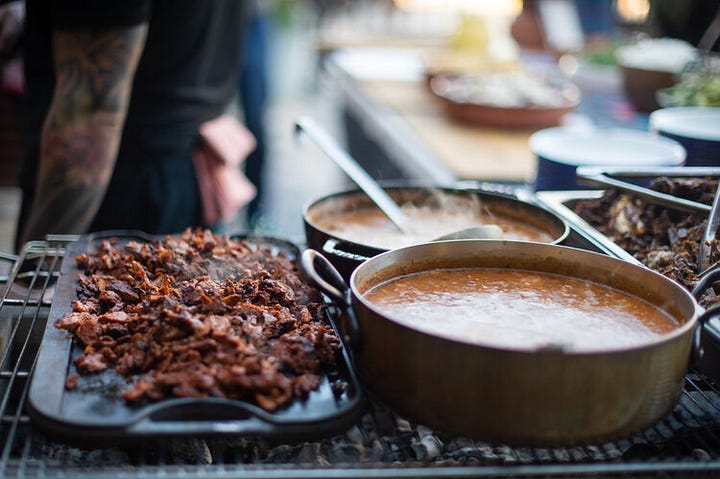
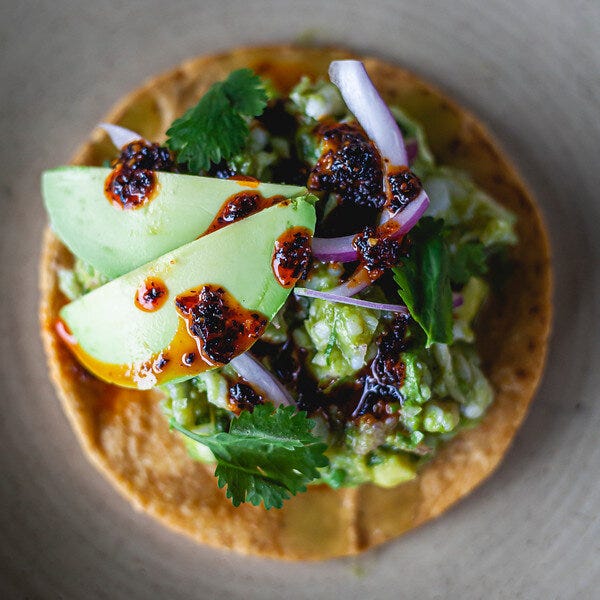
A lot of people that I interview for the blog have created a life that is uniquely theirs in terms of where they live, how they work, and live their life. What does the life that is uniquely yours look like?
The past couple of years have been nuts where I saw my career start to have a visual kind of tapering up. I work with brands. I did an ad campaign for Hennessy and another for Coca-Cola. I'm very fortunate to have good teams that allow me to do what I love to do, which is travel and work on projects I'm passionate about. I like working on different things.
When I was 18, I blindly made a list of things I wanted to accomplish as a cook, and I accomplished a lot of those things before the age of 30. I cooked in Europe, opened a concept by the age of 25, went to Dubai and opened up a fleet of food trucks at 26. I’ve been James Beard nominated and worked at Michelin-star restaurants.
My career started from such humble beginnings. I still carry that with me. Those experiences have informed my work ethic and approach. I try not to complain about opportunities or being busy because I asked for all of this.
What's next for you? What are you working on right now?
I have a few projects going on right now. I'm working on my first book. It's not a cookbook. It's a children's book about coping with loss because I lost my dog in December. She was 6, and it was a tragic thing. I'm working with an illustrator who was actually helping me on another book pre-covid that went by the wayside. I’m working on some concepts in DC with partners that I have out there. We have a fast-casual concept called El Oso and a full-service wood oven concept opening up in DC.
I'm about to go cook at the Melbourne Food and Wine Festival in Australia next month. I've never been. I’m working with ChefSteps on content, which is crazy if you know them. I used to watch their Youtube videos as a 22-year-old chef. I wanted to learn what they are doing and now I'm working with them. It’s come full circle. I’m just kind of taking it as it comes. I’m very fortunate to have opportunities coming up that I'm passionate about.
What's it been like for you to stretch your creative muscles in a new direction with this children's book?
The day after my dog passed away we were on a flight to Las Vegas because my girlfriend's family lives out there. We were supposed to spend the holidays with them. Little did we know we would lose her the day before. I was just writing stream of consciousness on this flight in my notes app. It's a longer flight so I was whittling it down and making it rhyme. Her name was Wednesday, but my sister called her “One Day.” The book starts off, “Not today, not tomorrow. But one day.” It’s a recurring theme about cherishing the memories along the way that are the good ones. It’s a beautiful story about my dog and what she did for my life. It’s been therapeutic to write it and work on it with this amazing watercolor artist. She has an amazing way of conveying emotions through her art. I’m making this for my family because she was such a big part of our lives.
I feel like you have this pattern throughout your life of being fearless about bringing things to life when inspiration hits. Even with this book, you had this point of inspiration, and you didn't let it stop there. You’re bringing it to life and working with an illustrator. What do you attribute that mindset to?
I think early on in my career, I would get invited to events and different things and would have this anxiety. I'd think, “I'm not ready yet. I don't know how to do these things.” It's not until you do your first one that you realize that it’s okay and you can do things.
As a creative, you have to be willing to fail because that's the reality of our industry. You have to be able to reframe failure. It’s okay as long as you're learning something. The experience helps you avoid a similar obstacle in your future or just humbles you enough in the moment to be able to say, “I tried. It didn’t work out. Now I know.” For me, it’s about not being afraid to fail, which wasn't always my strong suit. Now I think - “What’s the worst that can happen? Every question that you don’t ask is a no.”
